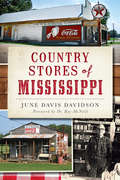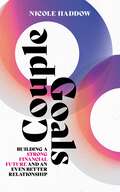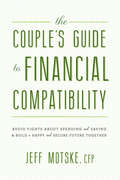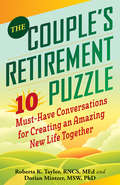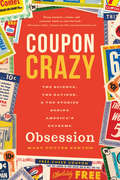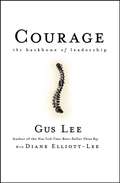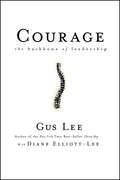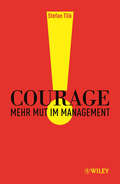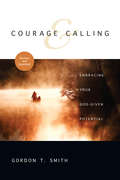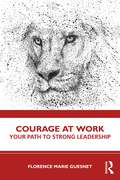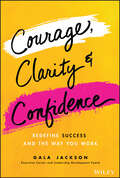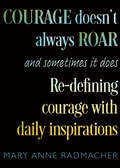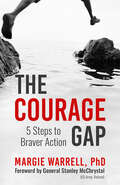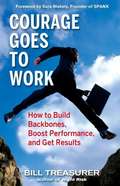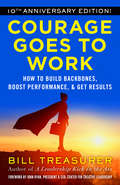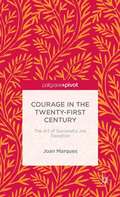- Table View
- List View
Country Stores of Mississippi
by June Davis DavidsonThe old country stores along the back roads of rural Mississippi are the treasures that remain of a bygone era. Travel back to the Mississippi of yesteryear and hear of the deadly can of molasses that once caused a massacre in Carrollton, Mississippi, in the late 1800s. Find the church near Alston's General Store in Rodney with a Civil War cannonball lodged in its front facade. Or discover the haunts of Causeyville General Store among shelves and corners stocked with relics of the American past. These and other stores remembered here by local author June Davis Davidson were the cornerstones of their communities, and harken back to a time when the sweetest things in life were the smell of peanuts roasting and reaching into the penny candy jar.
A Country That Works
by Andy SternAndy Stern, one of the most visionary leaders in America today, has fought relentlessly to ensure that Americans' hard work is rewarded in today's hypercompetitive, globalized world. As the newsmaking president of the fastest-growing, most dynamic union in America, he has led the charge for modernizing the "house of labor" -- taking unions out of the past and into the twenty-first century. He has spearheaded the campaign against the "Wal-Marting" of jobs and has innovated transformative solutions to the daunting problems facing Americans, from job insecurity to runaway health care costs. In this powerful critique and call-to-arms, he offers a revelatory dissection of the gathering threats to our standard of living -- threats that our politicians have failed utterly to address -- and he puts forth a bold, unassailable plan for making vital reforms. In his eye-opening diagnosis that makes the urgency of the threats vividly clear, Stern shows that Americans are contending with the most disruptive economic upheaval in the world economy since the Industrial Revolution. Yet, in the face of this daunting challenge, the American system simply isn't working well enough for most of us. Stern powerfully portrays how with the pace of globalization relentlessly quickening, the competitive pressures on our jobs and quality of life are heating up even more, especially as housing, health care, and oil prices skyrocket. While CEO salaries soar and business and the wealthy are handed plentiful tax shelters, the incomes of both white-collar and blue-collar workers stagnate, leaving most Americans struggling to pay off ever-escalating debt, instead of saving for retirement. The plain fact is that our system is out of whack, serving the interests of the top sliver of the most wealthy while putting the squeeze on the rest of us. Meanwhile, our politicians irresponsibly sidestep the crucial solutions that we so desperately need in order to make sure Americans can move into the twenty-first century with their futures secure. As Stern so persuasively shows, it is time for bold thinking and creative solutions to overhaul a health care system in crisis; correct a tax system rigged in favor of business and the wealthy; revamp our inadequate retirement system; and make truly innovative improvements in education. He presents a set of course-correction reforms so compelling, simple, and achievable that readers will find themselves enraged that they haven't yet been enacted. Americans have a right to expect our government to work for us. Andy Stern shows how we can get things back on track to make sure it does.
County Department of Public Health: Organizing for Emergency Preparedness and Response
by Lynda M. Applegate Ajay Vinze Minu IpeThe anthrax attacks of 2001 exposed serious inadequacies in the response of the U.S. public health system to meet such grave threats. The public health infrastructure required rebuilding to respond to any type of large-scale health emergency. The Public Health Department at Penville County had been charged with implementing an emergency preparedness and response system for the county. Federal funds were provided to the county to develop an emergency preparedness infrastructure that met the requirements specified by the Centers for Disease Control and Prevention. County public officials had to coordinate their efforts to ensure seamless communication, coordination, and information exchange between various divisions within the public health department, external entities, and the state public health agency. Focuses on the director of Public Health Department and the challenges he faced. Explores issues related to structure, organization, culture, and technology infrastructure.
Coupa
by Michael J. Roberts William A. SahlmanThe case describes the growth of Coupa, a software as a service platform for procurement / expense management. The issues in the case are around how fast to grow and how to finance that growth. The case includes a detailed financial model that will help students analyze the impact of hiring additional sales people and the consequent impact on sales and profits.
Couple Goals: Building a strong financial future and an even better relationship
by Nicole HaddowJournalist Nicole Haddow has entered a new phase of her financial life - as one half of a couple. At 39, she merged finances for the first time and as the author of Smashed Avocado and The Ethical Investor she had spent more than a decade researching personal finance, but is now discovering that sharing money and assets in the 2020s is complex. The traditional breadwinner husband and stay-at-home wife dynamics are increasingly rare. Relationships take many forms, with couples often having to navigate new social and financial issues. How do you split costs when one person earns more than the other? Should you discuss what happens if it doesn't work out? Is it right to ask your partner to contribute to your super while you're on parental leave? Should you go all-in with a joint bank account? How do you talk about money without killing the romance?Couple Goals is a practical and inspiring look at what can be achieved if you're a united team. Nicole shares her own story, talks to experts and couples who hold the secrets to success, and shows that when a couple is aligned in their financial values and vision for the future, anything is possible.
A Couple With Common Cents: A Short Story About Abundant Hope in Your Family Finances
by Ryan EidsonHow Does a Husband and Wife Come to an Agreement About Money? Tabitha is a young mother of two who struggles with her family's finances every day. She's tried to talk with her husband, Jack, about their money struggles, but he won't listen. A friend of Tabitha's invites her to a weekend women's conference.?How can Tabitha take off work and go to this conference, when she doesn't have the cash to go, and can't miss a day of work because their money is so tight?Find out how she overcomes these problems in "A Couple with Common Cents".
The Couple's Guide to Financial Compatibility: Avoid Fights about Spending and Saving -- and Build a Happy and Secure Future Together
by Jeff MotskeFinancial problems exact a toll on any couple. Long before you realize you are living well beyond your means, the burden of debt wreaks havoc in your life. Invariably, a basic lack of communication about money is to blame. This is where Certified Financial Planner Jeff Motske saves the day. Motske's financial services firm has helped tens of thousands of couples nationwide find happiness in love and money. The Couple's Guide to Financial Compatibility is the book to read now in order to avoid break-ups, divorce, or shelling out thousands of dollars in therapy later. It's filled with vital tips to help anyone at any relationship stage achieve financial freedom. Following a logical progression from combining finances to retirement planning, Motske gives you the tools you need to keep your finances healthy and the bond with your loved one strong. In an easy-to-follow style, this guide is organized around the questions partners need to ask each other, including: How do we align our goals and expectations? What do we need to discuss as a couple before we begin investing? What if one of us loses our job? Can we afford to have kids? What's the best way to teach our kids about money? What's the best way to get our kids through college? How do we take care of our kids and our parents at the same time? Do we have enough money saved up to retire? and over 100 more
The Couple's Retirement Puzzle
by Dorian Mintzer Roberta TaylorThe essential guide for couples to create a happy, healthy, and successful retirement! Retirement can be the best time of your life, but for couples, there's far more to it than cashing in on your 401(k). The most important asset you have during retirement is each other, yet many couples aren't sure where to begin to prepare for retired life or what to consider as they do. The Couple's Retirement Puzzle reveals ten key conversations couples should tackle before retirement to ensure a rewarding second half of life together, including: Do we have enough money to support the lifestyle we want? Should we retire simultaneously or separately? Do we stay put or explore new frontiers? What's the best way to stay healthy and fit after fifty? How do we meet new friends and create new interests outside of work? How will we balance time together and time apart? And more! Filled with smart practical advice, engaging anecdotes, and helpful exercises,The Couple's Retirement Puzzle will guide you and your partner to a fulfilling retirement you can enjoy and celebrate together.
The Coupling of Safety and Security: Exploring Interrelations in Theory and Practice (SpringerBriefs in Applied Sciences and Technology)
by Corinne Bieder Kenneth Pettersen GouldThis open access book explores the synergies and tensions between safety and security management from a variety of perspectives and by combining input from numerous disciplines. It defines the concepts of safety and security, and discusses the methodological, organizational and institutional implications that accompany approaching them as separate entities and combining them, respectively.The book explores the coupling of safety and security from different perspectives, especially: the concepts and methods of risk, safety and security; the managerial aspects; user experiences in connection with safety and security. Given its scope, the book will be of interest to researchers and practitioners in the fields of safety and security, and to anyone working at a business or in an industry concerned with how safety and security should be managed.
Coupon Crazy: The Science, the Savings, & the Stories Behind America's Extreme Obsession
by Mary Potter KenyonA fascinating history of this marketing tactic, and why some shoppers take it to extremes—from a longtime expert couponer. Coupon Crazy examines the phenomenon of avid coupon use and the socio-cultural and socioeconomic factors that construct it. By delving into the history of couponing, refunding, the science of shopping, and the dark underbelly of a coupon world the average American doesn’t even know about, Mary Potter Kenyon manages to both fascinate and educate. Readers will meet today’s “Coupon Queens” (and Kings) and learn about an era when trash really was cash. Not just an observer of this ethnographic research, Mary lived it for over thirty years.“My favorite aspect of the entire book was the candid tone Kenyon takes in sharing her story and others. As someone that both uses coupons and teaches couponing practices, I found the book triggering self-reflection at many points: Do I purchase products just because they are on sale? Do I devalue products I’ve gotten for free? Do I allow coupons to inform my purchases or the other way around? If you are a couponer, it’s quite possible you’ll find yourself reflecting on your own shopping habits as you read this book, too.” —Angela Russell, The Coupon Project
The Coupon Mom's Guide to Cutting Your Grocery Bills in Half
by Stephanie NelsonA book that pays for itself! The creator of couponmom.com, with 1.6 million subscribers and counting, shares her strategic money-saving techniques for saving big while living well Americans are hungry for bargains these days, but one woman has developed the ultimate strategy for enjoying a feast of savings. Taking the nation by storm, with appearances ranging from The Oprah Winfrey Show Stephanie Nelson has shown countless women and men how to save thousands of dollars by becoming savvy coupon clippers-without sacrificing nutrition or quality. Now, in The Coupon Mom's Guide to Cutting Your Grocery Bills in Half, Nelson demonstrates all of the tricks of the trade-beyond coupons and tailor-made for a variety of shopper lifestyles. Whether you're a "busy" shopper and have only a small amount of time each week to devote to finding the best deal; a "rookie" shopper who is ready to put more effort into cutting bills; or a seasoned "varsity" shopper who is looking for new ways to get the deepest discounts possible, this book offers techniques thatw ill make it easy to save money at any level and on any timetable. Extending her Strategic Shopping protocols to mass merchandisers, wholesale clubs, natural-food stores, drugstores, and other retailers, Nelson proves that value and variety can go hand in hand. With meal- planning tips, recipes, and cost-comparison guides, as well as inspiring real-life stories from the phenomenal Coupon Mom movement, this is a priceless guide to turning the checkout lane into a road of riches. Watch a Video
Courage: The Backbone of Leadership
by Gus Lee Diane Elliott-LeeCourage: The Backbone of Leadership uses true stories from Whirlpool, Kaiser Permanente, IntegWare, and other actual organizations. This book has three parts. In Part One, we learn what happens when courage is not considered and what happens when it is. Part Two deals with "Courage in Action." Part Three, "Growing Your Courage," concludes with a set of take-away practices. The book makes us learn to use specific tools and measurements to apply the behaviors of courage in everyday situations.
Courage
by Gus Lee Elliott-Lee DianeIn Courage, Gus Lee captures the essential component of leadership in measurable behaviors. Using actual stories from Whirlpool, Kaiser Permanente, IntegWare, WorldCom and other organizations, Lee shows how highly successful executives face and overcome their fears to develop moral intelligence. These real-world examples offer practical lessons for rooting out unethical practices and behaviors by Assessing them for rightness and integrity Addressing moral failures Following through with dialogue and direct action
Courage: Mehr Mut im Management
by Stefan Tilk"Wir sind Weltmeister im Zögern und Zaudern." Passender als mit dieser Aussage von Jochen Kienbaum von Kienbaum Consulting kann die aktuelle Situation in Deutschland und das Verhalten seiner Manager nicht beschrieben werden. Die weltweite Finanzkrise, zahlreiche Unternehmensbankrotte, Banken vor dem Aus, Massenarbeitslosigkeit und Sozialsysteme gefährdet - es gibt genug Gründe, den Mut zu verlieren. Aber hilft uns das? Schluss mit Jammern und weichen Knien fordert Stefan Tilk. Gerade in den Unternehmen braucht es Manager, die sich trauen, Probleme anzupacken, die wissen, wie man das Ruder herumreißt und wieder auf Erfolgskurs kommt. Das einzig Richtige in Deutschland wäre, das wieder zu entdecken, was viele in den letzten Jahren mehr oder weniger verlernt haben: Mut im Management. Mut ist keine abstrakte Tugend, Mut ist eine konkrete Fähigkeit, die Managern täglich, und besonders auch in solchen Turnarounds, abverlangt wird. Stefan Tilk weiß, wovon er redet. Er hat schon mehrere Krisensituationen in Unternehmen erfolgreich gemeistert. In seinem Buch zeigt er, wie und womit Manager Turnarounds schaffen können. Betrachtet werden einerseits Manager, die in Augenblicken der Wahrheit aus Feigheit "gekniffen" haben und andererseits die wenigen Vorbilder, die Mut bewiesen und einen Wandel bewirken konnten.
Courage and Calling: Embracing Your God-Given Potential
by Gordon T. SmithWhat is my calling? How do I live it out in the midst of difficult relationships or moral challenges? Will my vocation change as I enter a new stage of life? With competing needs and demands, how can I craft a balanced way of living?
Courage and Costs: Teaching Adaptive Leadership
by Sharon D. ParksWhat does it feel like to create and practice a way of teaching that keeps the teacher on the edge of new learning and under constant scrutiny? This chapter offers a rare opportunity to hear Ronald Heifetz reflect on the genesis of this approach and his own experience of learning to teach in this mode.
Courage at Work: Your Path to Strong Leadership
by Florence GuesnetCourage can shape our lives, as well as the workplace and business outcomes. Willingness and ability to take risks make space for major decisions. And it’s more than something to admire in others: courage can be learned, and this book will teach you.Building on examples from a 30‑year international career in marketing, coaching, and political activism, Florence Guesnet introduces the pioneering concept of the "courage zone." This shifts courage from unattainable heroism to a competence that can be built with five steps: recognize fear, perceive your heart’s desires, analyze reality, make a decision, and take the step. The book begins by strengthening the reader’s courage as an individual, inspiring a bold mindset and vision, and including hands‑on exercises. The book then goes on to show readers how to carry their courage into organizations and inspire others, addressing questions of governance, strategy, and everyday team encouragement against the backdrop of 21st century demands and typical paralyzing fears.Current and aspiring leaders in small, medium to large organizations will be empowered to take risks, surmount obstacles, and grab opportunities with this book’s effective tools to build courage in themselves and their teams.
Courage, Clarity, and Confidence: Redefine Success and the Way You Work
by Gala JacksonBuild a successful career with authenticity, confidence, and boldness The career roadmap every woman has been searching for is finally here! In Courage, Clarity, and Confidence: Redefine Success and the Way You Work, accomplished Executive Career and Leadership Development Coach Gala Jackson delivers a comprehensive playbook to help women reconnect with, or meet for the very first time, the strongest, boldest, and most courageous version of themselves. In her book, readers will explore their professional and personal journey; utilizing Gala’s ASCEND practice, readers will be able to define authentically aligned success and learn how to pursue it. The author shares her experiences and anecdotes from clients to demonstrate what is possible for women when they ditch the traditional patriarchal job search and career advancement methodologies that only benefit men. She also provides thought-provoking exercises throughout the book designed to equip you with how to build a future for yourself with courage, clarity, and confidence, even amid the challenging landscape of women and work. The book includes how to: Confidently embody the strongest, boldest, most courageous version of yourself to establish a career with flow and freedom Align your professional and personal identities for a new, empowering future without limitations Identify the power of your own voice and no longer minimize its value in or outside of the workplace Create and own your definition of success while leveraging your past and present professional experiences to achieve it Courage, Clarity, and Confidence is the professional guidebook for women searching for a tangible, practical, and action-oriented career roadmap that helps women cultivate their vision and voice and then guides them through how to harness their power to make it an everyday reality.
Courage Doesn't Always Roar, and Sometimes It Does: Re-Defining Courage with Daily Inspirations
by Mary Anne RadmacherDiscover Your Inner Courage“Courage doesn't always roar. Sometimes courage is the quiet voice at the end of the day saying, 'I will try again tomorrow.'" —Mary Anne Rademacher#1 New Release in Humanist PhilosophyWritten initially as part of a longer poem and featured in a gallery show in 1985, these words by Mary Anne Rademacher defining courage have traveled the globe.Defining courage in a beloved quote. The quote has been featured in ceremonies of all sorts and included in sports and network news broadcasts. Oprah has included it in her magazine and journalists include it in “top ten” lists across many disciplines and categories. And, it is among the most beloved quotes on cards, posters, journals, and gift books.Bravery comes in many forms. Rademacher insists in her book that we overlook opportunities for growth and personal celebration by shrugging off courageous acts of perseverance with, “I just did what I felt I had to do.” Courage shows itself in many ways from having the courage to heal, to change habits, to learn and begin anew, or even to speak up for yourself.Defining courage with daily inspirations. This daily companion for women, men, or anyone who wants to change for good, and live a bolder, more courageous life may be the perfect addition to the start of your day or the key to letting go and ending your day right. Featuring an introduction from courage specialist, Candace Doby, Courage Doesn't Always Roar begins as an invitation to recognize all of the ways courage, and the associated risk, show up on ordinary days. Inside you’ll find:Keys to finding and defining courage in your everyday life180 entries covering all aspects of courage, like: resilience, thresholds, choices, grace, and moreMental health-friendly inspirations meant to shape the way you think about courageIf you liked Courage is Calling, Inward, or Designing the Mind, you’ll love Courage Doesn’t Always Roar.
The Courage Gap: 5 Steps to Braver Action
by Margie Warrell, PhDDo you sometimes hold back when you know you need to speak up or step forward? Fear creates the gap. Courage closes it.This powerful guide from the bestselling author of You've Got This! cuts through the hype to connect the 'why' of courage to the 'how' of courage. Drawing on cutting-edge research woven together with stories that compel head and heart, The Courage Gap will help you bridge the think/do gap between what you've been doing and what you can do; between where you are and where you want to be-in your career, relationships, leadership, and life. Distilling theory and hard-won wisdom spanning from Margie's childhood in rural Australia to her decades of living around the world and coaching ‘insecure overachievers' in Fortune 500 organizations, Margie shares a powerful 5-step roadmap to reprogram the self-protective patterns of thought and behavior that sabotage success to bring your bravest self to your biggest challenges and boldest vision. At a time when courage seems in short supply, in a culture continually stoking insecurity and anxiety, this book will transform your deepest fears into a catalyst for your highest growth and the greatest good. Applying the five steps will:• Ignite passion and unlock the potential fear holds dormant• Rewrite the scripts that have kept you stuck, stressed, and living too safely• Reset your ‘nervous' system and embody courage in critical moments• Transform discomfort as a cue to step forward and expand your bandwidth for bold action• Reset your relationship to failure and make peace with the part of you that wimps out For leaders, The Courage Gap provides a guide to operationalize and scale the courage mindset across your team and organization to deepen trust, dismantle silos, foster innovation, accelerate learning, and unleash collective courage toward a more secure and rewarding future.
Courage Goes to Work: How to Build Backbones, Boost Performance, and Get Results
by Bill TreasurerTreasurer is the founder of a consulting firm that helps companies and individuals become more courageous in the marketplace, and this book is designed to help managers to avoid fear and operate out of business "comfort zones" that inhibit progress as well as profits. The author maintains that complacency is the same as fear in a corporate environment, and he offers a plan for making "giant leaps" by first harnessing fear, modulating comfort and setting up safety nets. This book also offers clear strategies for encouraging the same attitudes among employees in order to create a more unified and focused workforce. Annotation ©2009 Book News, Inc., Portland, OR (booknews.com)
Courage Goes to Work: How to Build Backbones, Boost Performance, and Get Results
by Bill TreasurerCourage Goes to Work is for every manager who has ever struggled with how to encourage employees to develop and show more backbone. This book helps managers inspire their workers to move out of their comfort zones and harness their fears so they can step up to challenges more readily and embrace company changes more wholeheartedly. When each and every worker goes to work each day with more courage, the capacity of the entire organization to be courageous is enlarged. The problem is that too many workers are too comfortable, too afraid, or too much of both. Courage Goes to Work helps managers address the problem of workers who are "comfeartable." Comfeartable workers don't exert themselves anymore than they have to. They equate "just enough" with good enough, and are satisfied meeting only a minimum standard of performance. Like a sofa loaded down with overstuffed relatives after a holiday dinner, teams of comfeartable workers become lethargic and are heavy with the weight of mediocrity. This book proposes that a manager's success, happiness and longevity depend on how he or she deals with comfeartable workers. The antidote to comfeartableness, as this book explains, is courage. When courage goes to work, workers they take on more challenging or complex projects. When courage goes to work people actively seek out tasks that stretched their skills and capabilities. When courage goes to work speak up more frequently, forcefully, and truthfully. When courage goes to work people say "yes" to company changes with more enthusiasm. When courage goes to work people are less risk-averse, less self-conscious, and less apathetic. And when courage goes to work, people do less brownnosing, ass-covering, and complaining. This book is all about helping people bring their courage to work.
Courage: The Heart of Leadership
by Annabel BeerelCourage lies at the heart of leadership. Leaders need courage to make wise decisions, not self-interested ones. They need to be able to set aside their egos, to feel vulnerable, to face challenges, yet remain principled and hold the course. This book presents many suggestions on how to make a real difference in organizations, and explains how one can develop the courage to be an effective leader, step by step.The book is designed to give leaders the self-awareness and the tools to overcome the obstacles that prevent us from leading effectively. Leadership requires working through the systemic barriers that serve as forcefields pulling and pushing us in various directions. Drawing on interviews with over 20 organizational leaders in a variety of industries, the book helps leaders to address key areas that are rarely discussed: the personal baggage attached to authority, self-esteem and self-differentiation, ego management, and the terror of the group. It highlights – with examples – how fear impairs our ability to make good decisions, and how our tendency to reactivity and the quick fix vitiates our attempts at being courageous. The hallmark of courage is the ability to have courageous conversations that invite transformation.The book is ideal reading for organizational leaders who are seeking ways to break through some of the personal and systemic barriers to leading with purpose in a way that makes a real difference.
Courage in the Twenty-First Century: The Art of Successful Job Transition
by Joan MarquesCourage outlines the art of moving forward both in professional and personal life. Marques offers a strategy for self-renewal in order to divulge the virtues and viewpoints to successfully move from one career to another.
Courage Is Calling: A Book About Bravery
by Ryan HolidayFortune favours the bold. All great leaders of history have known this, and were successful because of the risks they dared to take. But today so many of us are paralysed by fear.Drawing on ancient Stoic wisdom and examples across history and around the world, Ryan Holiday shows why courage is so important, and how to cultivate it in our own lives. Courage is not simply physical bravery but also doing the right thing and standing up for what you believe; it's creativity, generosity and perseverance. And it is the only way to live an extraordinary, fulfilled and effective life.Everything in life begins with courage. This book will equip you with the bravery to begin.
